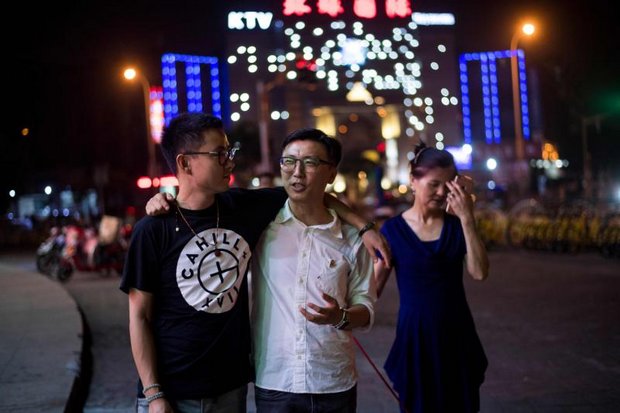
Grindr, the world's largest gay social-networking site, told the Shenzhen stock exchange recently that it plans to IPO overseas. Its owner, Beijing Kunlun Technology Co, a games developer, didn't give a date or location. But the announcement revived concern in the gay community locally and worldwide about the app's Chinese ownership.
It didn't help that six months ago, China's second-largest social-networking site, Sina Weibo, was planning to restrict LGBT content (it later backed down).
The concerns are legitimate. While public attitudes toward LGBT people have become more open and friendly in the last two decades, the Chinese government remains socially conservative and wary of any platform that might advocate for rights -- LGBT or otherwise.
Nevertheless, a younger generation sees things differently, and as views change, commerce follows. Chinese LGBT consumers, a market segment that wasn't recognised a decade ago, are emerging as a spending force in a country that needs more spenders. Beijing won't shut down the so-called "pink economy", no matter how uncomfortable it may be about lifestyles and rights.
Legally, the status of LGBT people in China hasn't changed since the government decriminalised homosexuality in 1997, and it's unlikely to evolve soon. Attempts to organise in support of rights, even recognition, are typically met with similar crackdowns to those faced by political dissidents.
Last year, for example, Rela, at the time China's most popular social network catering to lesbians, helped organise a group of parents who turned up at Shanghai's famous marriage market in search of partners for gay sons and daughters. A confrontation ensued with police and parents of straight children, and within a week Rela was shut down. Users have given up hope that it will return.
Such reactions tend to distract from a more complicated reality. In China's big cities (and increasingly, smaller ones), bars and other businesses catering to LGBT people have been fixtures for years. Focused events, such as film festivals, are becoming commonplace (as is the backlash). And while gay rights remain off-limits officially, young urban Chinese can be outspoken in defence of the community, whether they belong to it or not, especially on social media.
Out of the public eye, LGBT life thrives. When it was shut down, Rela had 5 million registered users. Blued, China's largest social-networking app catering to gay men, claims 27 million registered users. Overall, the LGBT population is estimated to range from 70 to 90 million.
LGBT people in China generally have larger disposable incomes than their straight counterparts (around five times the national average, according to one recent survey). London-based LGBT Capital, which specialises in early-stage investments in consumer businesses focused on that community, estimates that the annual purchasing power of this group in China reached US$938 billion in 2017, and is now roughly equivalent to that of the US.
Such estimates are open to question, but it's clear Chinese and foreign companies are paying attention. LGBT-oriented marketing has been a fixture for years, and some big companies strive to show a friendly face: In 2015, Alibaba Group Holding Ltd paid for seven gay and lesbian couples to get married in Los Angeles (they can't do it in China). Travel destinations, too, have embraced LGBT tourists. Bangkok is so popular that Chinese have become major buyers of homes in the famously gay-friendly city.
Blued taps this spending. Unlike Grindr, which relies on subscriptions and advertising for revenue, the site has branched out to offer live streaming, games, e-commerce and health services. Investors are taking note: A unit of the state-owned Beijing News newspaper group bought a stake in the company in 2017. In February, Blued completed a $100 million Series D funding round to help with international expansion.
At this point, Grindr is an also-ran. An IPO will help the app connect China's gay consumers with counterparts and businesses around the world, multiplying its opportunities. But with opportunity comes risk: Last month, Beijing abruptly curbed video games, sending shares of Tencent Holdings Ltd -- a national champion -- into a tailspin. A similar crackdown on LGBT content could be fatal for China's gay social apps.
With every year that passes, however, the likelihood of that happening recedes. LGBT people are becoming too integrated into China's society and economy for the government to turn back. Gay rights are unlikely to be on the official agenda soon, but for Beijing, the right to socialise and shop may be inalienable. - BLOOMBERG OPINION
Adam Minter is a Bloomberg Opinion columnist. He is the author of 'Junkyard Planet: Travels in the Billion-Dollar Trash Trade'.
